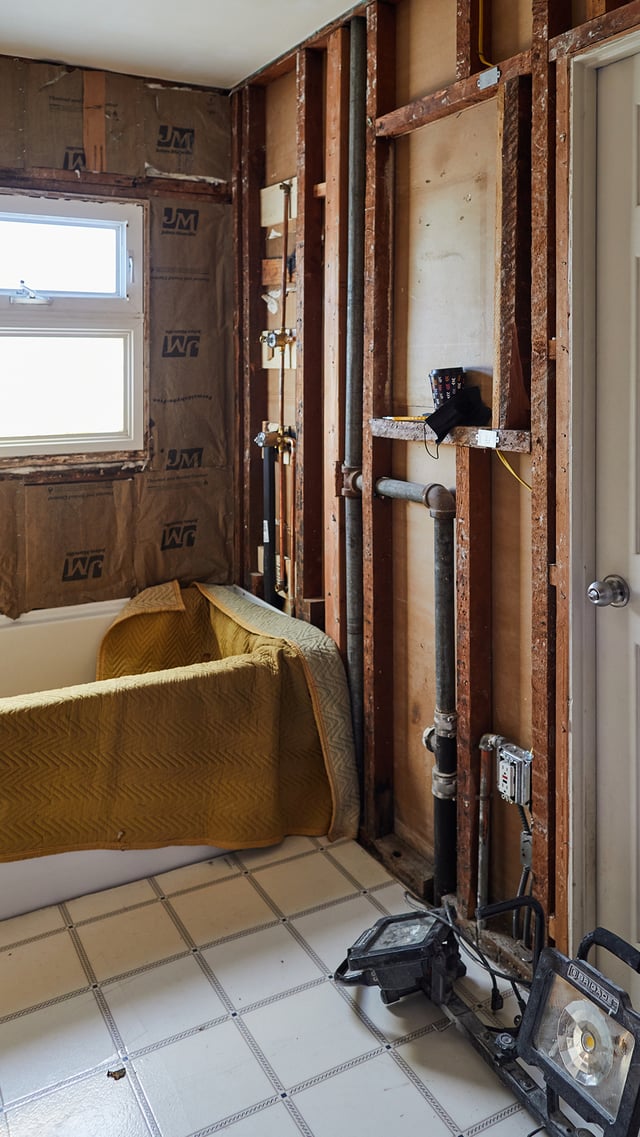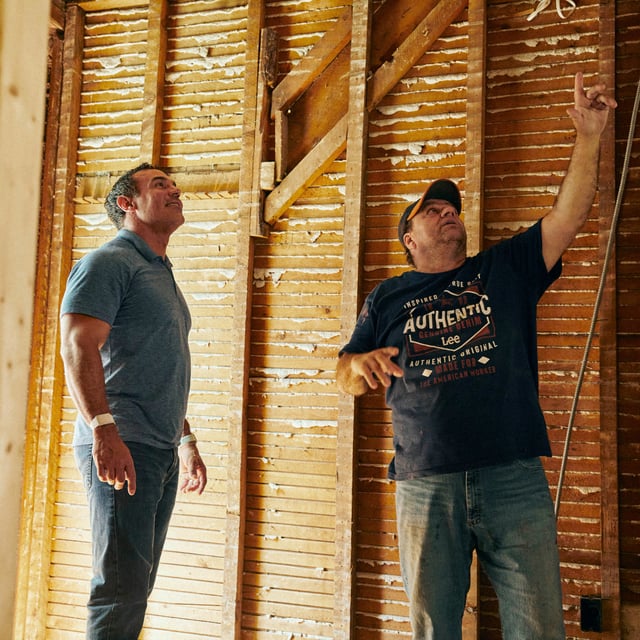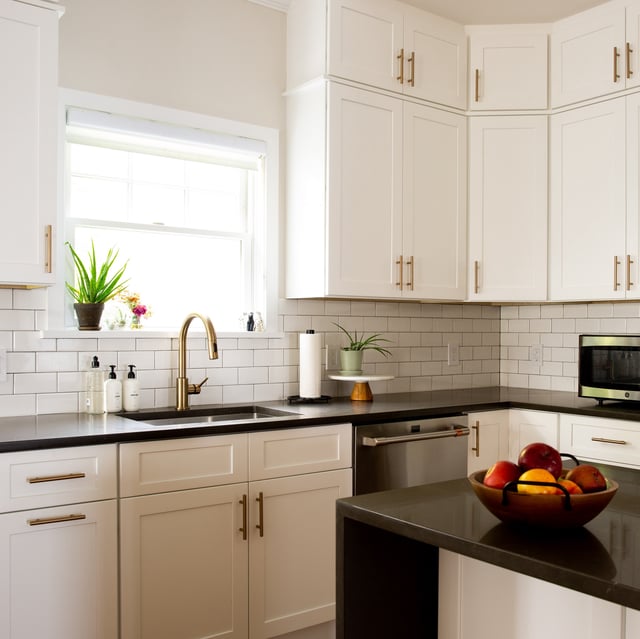
Contractors
50 Most Common Home Renovation Questions (Answered by Experts)
10.28.2025


In This Article
Ah, home renovation—the sweet promise of a shiny new kitchen or spa-like bathroom can make anyone giddy. But let’s be honest, living through it? Not so glamorous. Between the constant noise, the dust that seems to find its way into every nook and cranny, and the ever-present risk of stepping on a stray nail, it can start to feel like your home is more a construction zone than a sanctuary. That’s why deciding where to stay during a renovation is almost as important as picking out the perfect paint color or tile. The right temporary living arrangement can mean the difference between a relatively smooth remodel and an experience that has you Googling “how to live peacefully with contractors.”
Staying put during a renovation might seem like the easiest option, but it’s not always the best one—unless you’re a fan of waking up to the sound of jackhammers or eating takeout every night because your kitchen is out of commission. For most people, finding somewhere else to stay is the smarter move. Not only does it give you a break from the chaos, but it also allows the contractors to work more efficiently without worrying about stepping on your toes—literally and figuratively.
Choosing the right place to stay matters because it impacts your daily life, your stress levels, and even the pace of the renovation. A well-thought-out temporary living situation can keep your routine intact as much as possible and ensure that you return to your home exactly when you planned, not months later.
So, where do you go when your house is temporarily uninhabitable? Depending on your needs and budget, there are several options, each with its pros and cons.
If you’re looking for something that feels a little more like, well, a home, a short-term rental might be your best bet. These are actual houses or apartments that can offer you the comforts of a real home—without the dust and debris. The trick here is to find a rental that allows for a flexible lease so you’re not tied down for longer than your renovation. Ask a Realtor or check online listings, but be clear about your timeline and any potential extensions.
If you’re craving convenience and amenities, an extended-stay hotel suite could be a great option. These suites typically come with a kitchen, living area, and all the little luxuries you’d expect from a hotel—like fresh linens and someone else to make the bed. While this option can get pricey, some hotels offer special rates for longer stays, so it’s worth asking about a discount for the duration of your renovation.
Moving in with family can be a blessing or a curse, depending on your relationship. While staying with relatives is usually the most budget-friendly option, it can also test the limits of family bonds. However, if you have a relative with space to spare and a willingness to tolerate your presence for a few weeks (or months), this can be a cost-effective solution. Just remember to contribute to groceries and utilities to keep things harmonious.
For a more customized experience, consider Airbnb. Whether you want a cozy apartment in the city or a cabin in the woods, Airbnb offers a wide range of options at varying price points. The flexibility of booking for exactly as long as you need is a big plus. Just be sure to read the reviews and understand the cancellation policy, in case your renovation timeline shifts.
If you’re feeling adventurous (or desperate to stay close to home), renting an RV and parking it in your driveway is a creative solution. This option allows you to stay on-site while avoiding the worst of the mess. You’ll have your little slice of home just steps away from the chaos, but without having to actually live in it. Keep in mind that RVs are compact, so this works best for smaller families or individuals who don’t mind close quarters.
Often overlooked, corporate housing provides fully furnished apartments designed for extended stays. These are usually aimed at business travelers but are equally suitable for anyone needing temporary housing. The units are typically well-equipped with all the essentials, from kitchen appliances to Wi-Fi, making them a comfortable option for your renovation.
Now that you know your options, it’s time to narrow them down. The best choice for you will depend on several factors, including proximity to your home, available amenities, budget, and the expected length of your renovation.
If you want to monitor the progress of your renovation, choose accommodations nearby. This will make it easier to drop in, check on the work, and make any on-the-spot decisions. However, if the noise and stress are too much, staying further away might give you the peace of mind you need.
Think about what you can’t live without during this time. Do you need a full kitchen? Reliable Wi-Fi? A pet-friendly space? Ensure your temporary home has the essentials to keep your life as normal as possible.
Renovations can already stretch your finances, so consider your budget carefully. A more expensive option like a hotel suite might offer convenience, but a home rental or Airbnb could provide more value for your money over an extended period.
Be realistic about how long the renovation will take. Add a buffer to your timeline to account for any unexpected delays. The last thing you want is to be scrambling for a new place to stay because your current arrangement fell through.
Moving out of your home, even temporarily, can be stressful. Here are some tips to make the transition as smooth as possible:
Only bring what you need for your stay. Think of it as packing for an extended trip rather than moving out entirely. This will help you avoid clutter and keep your temporary space livable.
Keep a file with all your renovation details, including the contractor’s contact information, timeline, and any agreements in writing. Being organized will help you stay on top of the project and reduce the chances of miscommunication.
Regular updates from your contractor are essential. Make sure there’s a clear line of communication and that you’re both on the same page regarding the timeline and expectations.
Sometimes, leaving just isn’t an option. If you decide to stay home during the renovation, be prepared for some serious lifestyle adjustments.
Know when the workers will be in your home and plan your day accordingly. Try to stay out of their way during work hours, but make yourself available for any decisions or issues that arise.
If your kitchen is out of commission, plan to eat out more often or set up a temporary kitchen with a microwave and mini-fridge. If the bathroom is being remodeled, coordinate schedules with family members to ensure everyone has access when needed.
Designate a room or area in your home as a no-construction zone. This will give you a place to retreat when the noise and mess become too much.
Staying home during a renovation can be challenging. Still, with the proper planning and a bit of flexibility, it’s possible to survive the experience with your sanity—and your home—intact. After all, a little inconvenience now will be worth it when you’re finally enjoying your newly remodeled space.

Written by Block Renovation
What is the best way to find short-term rental options during a home renovation?
How long in advance should I book temporary accommodation for a home renovation?
What are the average costs for different types of temporary housing?
How do I handle mail and deliveries while staying in temporary housing?
What amenities should I prioritize when choosing temporary accommodation?

Renovate confidently with Block
Easily compare quotes from top quality contractors, and get peace of mind with warranty & price protections.
Thousands of homeowners have renovated with Block

4.5 Stars (100+)

4.7 Stars (100+)

4.5 Stars (75+)

Contractors
50 Most Common Home Renovation Questions (Answered by Experts)
10.28.2025

Process
Gutting a Bathroom: What It Entails, Costs & Timeline
07.15.2025

Timelines
What's the Best Time of the Year to Renovate?
05.15.2025

Planning & Logistics
How to Start Planning a Home Renovation
04.28.2025

Kitchen
How Long Does a Kitchen Remodel Take?
04.01.2025
Renovate confidently